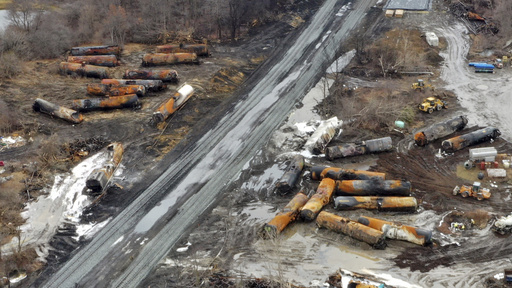
EAST PALESTINE, Ohio — As the second anniversary of the catastrophic train derailment in East Palestine approaches, a lawsuit has emerged, marking the first instance of wrongful death claims linked to the incident. This lawsuit adds to the legal actions surrounding the 2023 disaster that took place near the Ohio-Pennsylvania border, coinciding with a surge in litigation against Norfolk Southern railroad.
On the anniversary date, Vice President JD Vance plans to visit the area, along with Lee Zeldin, the newly appointed head of the Environmental Protection Agency (EPA), who is part of the Trump administration. However, it remains uncertain how much influence the administration will exert on the railroads regarding safety enhancements or if they will advocate for the legislation co-authored by Vance following the derailment.
The newly filed lawsuit alleges seven wrongful death claims against Norfolk Southern, including a claim linked to the death of a one-week-old infant. Accusations against the railroad include mismanagement of the cleanup efforts, which experts from the EPA and Centers for Disease Control and Prevention (CDC) reportedly approved, despite failing to sufficiently inform residents of the associated health risks. Many involved in the lawsuit report ongoing, unexplained health issues and worry about potential long-term effects.
“Our clients seek the truth and transparency,” stated attorney Kristina Baehr, who represents approximately 750 individuals affected by the incident. “They deserve to understand what they were exposed to and demand accountability for what transpired.” The lawsuit outlines some of the ongoing consequences families have faced, although it does not delve into specifics regarding the fatalities.
In the week prior, at least nine additional lawsuits were filed by individuals and businesses claiming that Norfolk Southern’s greed was a factor in the derailment. They argue that the $600 million class-action settlement is insufficient compensation and does not adequately penalize the railroad to deter future incidents. This settlement represents only a minor portion of the $12.1 billion in revenue the railroad amassed over the last two years.
The train derailment occurred on February 3, 2023, when multiple rail cars came off the tracks due to a failed overheated bearing. This led to hazardous materials spilling and igniting. The situation escalated three days later, when emergency responders decided to vent and burn five tank cars filled with vinyl chloride to prevent potential explosions, generating a considerable cloud of toxic smoke. Investigators later concluded that the venting and burning tactic was unnecessary, as there was evidence indicating that the tank cars were cooling and posed little risk of explosion. Local and state officials have maintained that they received no indication that the tank cars were safe.
Baehr criticized the EPA’s failure to adhere strictly to their guidelines, alleging prioritization of expedient recovery rather than public safety. Officials have not yet provided a response to inquiries regarding the new lawsuit or other federal claims brought against the EPA and CDC. In their defense, the EPA has previously stated their role was purely to assess the ramifications of releasing and igniting the vinyl chloride and to monitor contamination levels.
Baehr compared the EPA and CDC’s actions to those observed in other environmental crises, noting how agencies typically downplay health risks. Community members have voiced dissatisfaction with the data provided by the EPA and the reluctance of class-action attorneys to disclose the results of their tests.
Norfolk Southern has chosen not to comment on the ongoing litigation. The railroad previously agreed to a $600 million settlement for those living within 20 miles of the derailment site, alongside another settlement with the federal government for cleanup efforts and medical assessments. Both settlements did not involve any admission of wrongdoing from Norfolk Southern.
In response to the disaster, Norfolk Southern and other leading railroads vowed to enhance safety protocols by adding more trackside detectors to identify foreseeable mechanical failures. Federal representatives have stated, however, that these measures have not considerably improved safety. Vance’s proposed legislation aimed at further changes did not pass. On the same day, rail unions again urged railroads to participate in a federal program designed to allow workers to anonymously report safety issues, and congressional members aim to renew their legislative push.
As for compensation, some residents have begun receiving personal injury payments from the class-action settlement; however, a significant portion of the settlement is still pending due to appeals for increased compensation and clarification on contamination issues. The primary financial distributions, amounting to $70,000 per household, will be withheld until appeals are resolved.
Recently, Norfolk Southern also consented to a $22 million payout for East Palestine, which includes $13.5 million already allocated for water treatment facility upgrades and replacements for police and fire equipment, in addition to a $25 million investment in park improvements.
The other lawsuits filed recently encompass various claims from local businesses, such as a pipe manufacturer, dog kennels, and a winery, asserting that the derailment damaged their operations. One establishment highlighted how cleanup efforts resulted in unpleasant odors, debris, and flooding issues. A dog breeder has also claimed that toxic substances led to the deaths of 116 puppies and three adult dogs.

